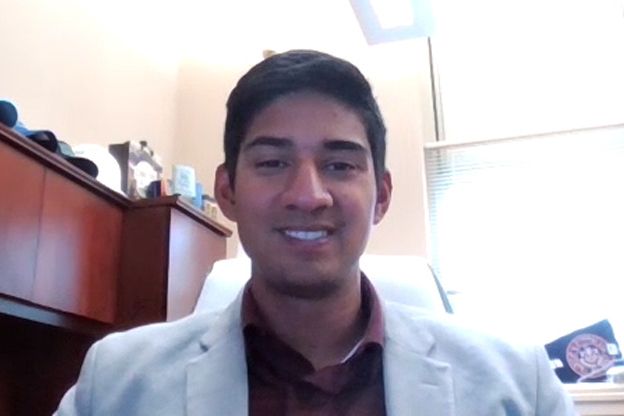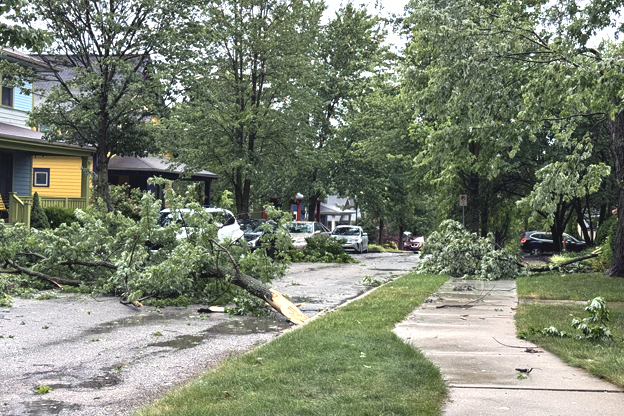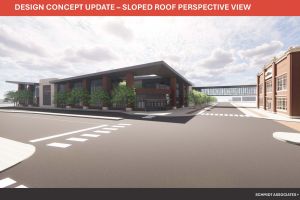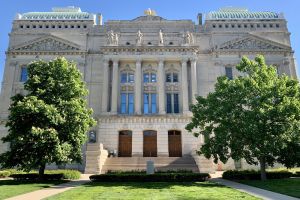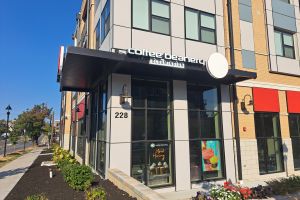Those of you listening we did talk about the YMCA renovations last month you could go to that podcast and listen more there. But I want to turn our attention to the hurricane remnant spreading across the Midwest. FEMA is asking states to prepare is there anything residents should do? Are you hearing anything about this? I know it's a slight chance of tornadoes but it seems like if anything, it's the flooding that officials are worried about. You still you know whether it's this situation or one a few weeks ago the storm two weeks ago we stay connected with VO County Emergency EMA and we work with them in terms of hey, here's what we think's coming. If we think a storm
When was coming into play? One of the first things I do in our in our kind of crisis management plan, open up all communication channels with our utility partners ensure that the Streets Department wastewater department, parks department, police and fire are all prepared. Our our first goal always is safety. And then it's traffic. Can we as everyone save? How are the utilities dealing with getting power getting gas back on? And can we open our main thoroughfares and our side streets, once we transition to them, then you see us take a couple of days that has passed tormented in 18 hours. But after that phase of opening up that traffic, then it goes to right away, treat pickup all the limb all the debris, we still haven't finished recovering from the storm a few weeks ago. Right? These are three or four week pickup times that we enter in. You know, this, this community was heavily impacted by a flood about 1516 years ago. So it is in the back of folks minds. We continue to push information from video County EMA just to keep the public aware. Ultimately, at the end of the day, that happens, I believe the city is prepared as much as we can be in terms of city employees. It it does shed light on some of the work we did in March and April. We did a lot of preventative tree cutting and trimming with Duke Energy around our circuits. So we have about 40 circuits in Terre Haute 28 went down last year, only 12 went down a few weeks ago. So how can we make sure we're managing the areas in around these circuits to keep the power on.
And you mentioned debris pick up from the storm from Terre Haute all the way to Bloomington got the brunt of it. That happened, I think just days that are a day after our interview last month. So we did just just missed that on the show.
Where are you now in the debris pickup. So within 96 hours, we transition solely to pickup what we do with that, you know, we divide our two chippers and our two dump trucks to a north to the south team. Working towards the middle, of course, sometimes will come through four or five streets and then we see stuff on the side of the road again, that's fine, it happens. We acknowledge that we can't expect everyone to get all their stuff kind of that fast. So we're just trying to maintain that flexibility. So the street department works on that. It after the major event happens you do see wastewater a IN THE STREET DEPARTMENT and all our departments out there again to open everything up. And as we transition to pickup, JUST THE STREET DEPARTMENT maintains that I would say I think three weeks from now we'll be in a good spot. What do I say three weeks, every time we allocate our resources to pick up, you see us as a municipality fall behind in terms of alleys, why White Rock, sometimes even large item pickup? So you know, it's always a juggling act of where you're diverting your resources. So from a logistical perspective, we look at labor vehicles, how can we pair up enough vehicles that the gas mileage is right on point? Do we have good communications with the
the dump and Republic? Do we take it straight there? Do we take it to another limb disposal site, our cemetery department actually needed to fill in kind of some craters. So we were able to divert a lot of limbs there, which saves us time, energy and resources to get back on the road. That's the logistic calculus that we kind of continuously play in these events. You know, it is one of those dreaded events is amoenus. As a mayor, as a governor, as a city council member, as a legislator that you get that call at midnight, hey, and natural disasters heavily impacted your community. And you're constantly thinking Is everyone okay? Is everyone safe?
Is there is any, you know, mayor ever going to get 100%? Right? I just don't think so. Right? At the end of the day, there's always an individual concern that you haven't moved quick enough on. But what we do do is we conduct a thorough after action review, to identify how we can improve on the next go around. How can we get better we take that internal look in the mirror, kind of like a coach in a locker room saying, hey, let's adjust this play here. Let's adjust this play there. And we get better.
One more quick question on that there was a declaration of emergency. What does that mean and for residents, and for those that need help? That's a good one. So the emergency declaration what it does is it allows residents to report damage to the 211 system. And we need that damage reported because it does help not just with insurance, but really for the state and Department of Homeland Security to manage and track resources at the state and federal level.
So we always encourage folks to report that information. But we also do is it helps us you know knowing if it's a natural disaster and that emergency declaration is declared. There's a possibility that financially we receive a little bit of support for the overtime. The tariffs food department used to be 68 employees, property tax caps happen. Budgets got hit with a circuit breaker
They are down to 34 union employees. So, you know, when you look at the state and the frustrations around assessments and property tax,
were so much lower compared to other Midwestern states compared to other states in the nation. And how does that impact local government? Well, folks expect the same services here, as municipalities across the nation. And sometimes it's, you know, hey, we actually don't We don't have the crews that we used to. We are working as hard as we can. So that emergency declaration helps out with some of the financial discussions with overtime and keeping guys going throughout the storm.
All right, I saw a press release today. Exciting for Terre Haute. The US Department of Energy's loan programs announced a conditional commitment of up to $1.2 billion a direct loan to end tech, the lithium battery service that will finance a new facility in Terre Haute. So that's great news for Terre Haute and in tech, it is in from a development perspective. Right? As you're moving towards the industrial park, you're asking yourselves a couple of questions and local government from a utilities perspective. Are we setting the conditions for this project? Or are we setting the conditions for future projects while also improving services to those along the improvements? And it it sounds complex, but here's how I phrase it, are you going to do an eight inch water pipe with Indian American Water or 12 inch that allow surrounding neighborhoods to now tap in. So you're really trying to synchronize utilities, you're working with the company to make sure that construction is going on Play on time, your engineering departments reviewing plans, you know, issuing out building permits, and that's an in the county, right, it's the County Industrial Park. But you see all of these entities in govern, just making sure that this balancing act isn't for one future customer. But for the current customers and future customers at large, not just one. I think that's really the difference that you're starting to see here in Terre Haute, whether it's the development of a billion dollar, lithium and these battery separators for a project like the Indiana theater, it's really practicing the principles of capital stacking Municipal Finance, and also collaborating right collaborating not just with other county governments and state government, but with the private sector as well to open your community up for development while maintaining or increasing services to the folks already here and who's your state.
And I see some good news. I was checking out your Twitter before we got online here you reported four homes completed on lots that were once owned by the city all for sold already. Is this coming from that joint housing program that the builder brands that we've been talking about? That is actually that's old news. Why? Because today we celebrated the completion of phase one of a larger project 15 infill lots filled with 15 homes, the builder starting construction on another 15 this week, and that's the Terre Haute difference right there. Those are 30 vacant lots 30 parcels that now they're built on. They're paying taxes, families are moving into them. And we are quite literally taking all those federal taglines, right, whether it's Make America Great Again, or build back better. We're taking those practices and applying them here at the ground level. I'm very proud of the work that we do when it comes to housing, or updating and upgrading our housing stock that is amongst the oldest in the state. So we're using tools right. Like the Thrive West Central's builders program, these grants that are funded from the American rescue plan. But on top of that, we're updating our building codes or building permits and the systems and software's we use. We're taking a look at our sidewalks, making sure we can connect neighborhoods with schools, with grocery stores with parks. And we're looking at some of the new tools that the state's offering, whether that's the IFA home loans, or residential tips and provide carve outs to make sure that your school corporation is still getting a little bit as well. These are the tools that we are bringing out to make sure that Terre Haute can grow in preparation for that census in 2030. And some folks, they might not see that the first year. They'll see a new home, they'll see the price. And I get it can be frustrating sometimes looking at the price and saying well, you know, it's not 50,000 it's 150,000. Right? Well, at the end of the day, we've got to grow the population here in Terre Haute, Indiana. And we've got to do public private partnerships with the land that we have available, and the programs and tools that are currently on the draft board. We can work with the state legislator and at appeal for you know, funding to rehab some older homes that are privately owned, but those tools aren't there today. So let's see what we have on the chessboard and utilize it to get across the goal line and increase our housing stock. Man I was just checking even June's numbers, and I saw plenty of new permits pull for new construction and rehabilitation
When you're talking about the chess board, I know a vote is coming or maybe already is on the right of way changes and sidewalks. And I believe these are what you called outdated ordinances that need some revelant. Or relevance to what's going on now. Yeah, that's a good another good question there. So tomorrow our July 11 11, is when those go up to vote. So we want to start the tariff sidewalk initiative. Right. In these guys. I believe it's Vision Zero. Mayor Carrie Thompson in Bloomington. I mean, then she's running laps around us other mayors because she's committing all into pedestrian safety. So, you know, on one hand, it's like, she lets us get half done and what what she's getting down when it comes to sidewalks and the planning there. So these are projects that when you look at, you know, the federal government's push when it comes to pedestrian safety in the States, it aligns with those, it stimulates the local economy, getting that pedestrian foot traffic back. And honestly, some folks have been in this community for generations generations jail and haven't had a sidewalk or haven't had their sidewalk repair. So now before we just earmark and start pushing money to something, we've got to get the software, right. That's a key part of all those. It helps us create a plan that we can follow over 10 years to address the sidewalk inventory here in Terre Haute. So we're doing these kind of at the same time doing two projects this year on top of what we already had budgeted to increase our production this year, while also deliberately planning on the next couple of years. I want to make sure is the right of way changes. Is that to do with sidewalks as well, okay, does that anything to do with installation of broadband and that? So this different? That was a previous ordinance that we didn't February focus on right of ways and going underground. This next right away ordinance is focused above ground, right. Those are what's called aerials. Can we make sure that when these aerials are coming in, they're correctly marked, right? That is a right of way, there is a right of way fee to that that just hadn't been added? How what's the distance? How far are you going? These are updates that the state code has already taken on. Many municipalities have already taken on. And honestly, I drive our alleys all the time. And every time I see it down wire, I can usually tell is that telecommunications or is that kind of a power line. And you can tell pretty quick. Those are unsafe. Those are hazards to our kids walking around playing right now. And this right away legislation addresses that it holds folks accountable.
Let's talk a little bit about the 12 points area in Terre Haute. I remember talking with former mayor Doug Bennett about this maybe even a couple years ago, it's been a long time though in some outside the city may not really know what we're talking about. Can you explain 12 points, and what's all happening there in terms of, I guess a resurgence of that area. So the best way I can describe it is imagine kind of a neighborhood pharmacy and neighborhood grocery and a neighborhood kind of shopping hub that is off of your downtown area. It's away from your East Side interstate kind of ice 70 chain restaurant village. And this neighborhood used to have strong characteristics to it. You know, and even had its own little movie theater. And is is America's a nation kind of grew out instead of up as we went from a one car household to a two now I'm pretty sure what like at a 2.2 car household don't die yet 2.2 cars. But what we're seeing here is small businesses coming in. We have tariff foods, right? It's a food coop. We have 12 points market, which is kind of similar to like a bottleworks coming in. And we're starting to see businesses pick up their energy, their investments, we're doing our best to match that in terms of sidewalk improvements, connecting neighborhoods to some of these centers that are now popping back up. Ultimately, a lot of what we'll see some vacant buildings there. They're not publicly owned. So we cannot do our RFP process to redevelopment and enter in large scale public private partnerships yet. That is an opportunity in the future. She has not today. So we are seeing growth and improvement there. There was a food truck village that has now kind of switched in in the services that they offer. But we just opened our first cat cafe in Terre Haute. I mean, who would have thought Terre Haute Indiana is now having cat cafes on top of a food Co Op and in public market, all of them to two blocks banned. Fortunately, we do have a 501 C three the 12 points revitalization group. They are great to work with they bring their passion for the neighborhood help work with the city when it comes to you know, hey, how do you fund ideas or hey, what's kind of in municipal government and more so on the private sector?
I know we have to get going but I know you
saw a tweet. You're pretty excited about the Olympics. Yeah.
Yeah, we are to Indiana State athletes who will be competing. A good friend of mine. I'm in Austin under
tyre for his fourth Paralympic Games. He's already got one goal and brought it back to Terra and we wish him the best hope he brings another. And of course my sister right my sister will be participating in the Paris Olympics this year for teen Cambodia. My father has survivor Cambodian genocide as an American citizen, and she has dual citizenship. So I'm looking forward to cheering her on. She is a better swimmer than me. Without a doubt. I think I could get her in one or two events nowadays. But that's about it. So I'm looking forward to cheering her on here in August. Whenever I see or even hosting a lot of events to talking with people I just read about mile with the mayor, not to be confused with run with the mayor that those are different things. And then they also with the mayor, they some of those walkers really pushed me let me tell you, that is one of our initiatives to address a public health ranking here in the community. We've seen increased Park programming, pickleball tournaments, summer day camps, coed kickball tournaments. And now we're starting to see programs really, for seniors and kids like mine, with the mayor, getting folks outdoors to explore our parts department, lace on those tennis shoes and just walk a little bit we do anywhere from one mile to about a mile and a half, sometimes closer to two miles just depends on the park. They good turnout. We I mean, we've had quite a few people before our law enforcement personnel come out and join us as well, making sure everyone's safe. And it's a good time, right. You know, everyone has their their complaints, their frustrations, and you actually don't see them bringing those there, but really just enjoying nature and having conversations, not just about the parks or about the city but about life at large. So we're quite literally taking a step forward when it comes to public health with our mile to Mayor program.
I always like to leave the last minute to you any announcements, things that we need to know. You know, we're really looking forward to continuing to monitor the casino gaming revenue and the taxes that that brings in that's helping us really retool, refine our budget for 2025. But at the end of the day, Joe, it's been a long, six months. I'm proud of the progress that we've made. And we're really setting the conditions for growth here and the next six months but also the next three and a half years to 10 years.
Right and thank you so much for your time. Appreciate it. Great talk in Terre Haute and hopefully we'll have some good weather. I'll come up. We'll meet at the park. I'm really, really excited to talk about the potential developments and stuff happening at Fairbanks. Absolutely. Looking forward to it. I'll see you bye bye







